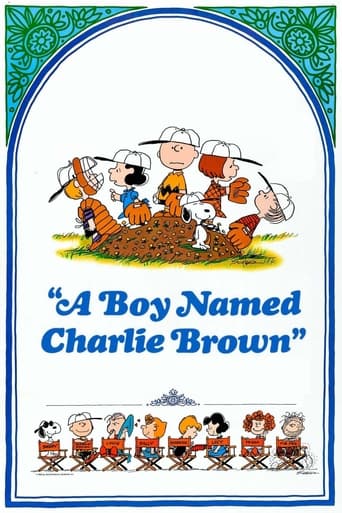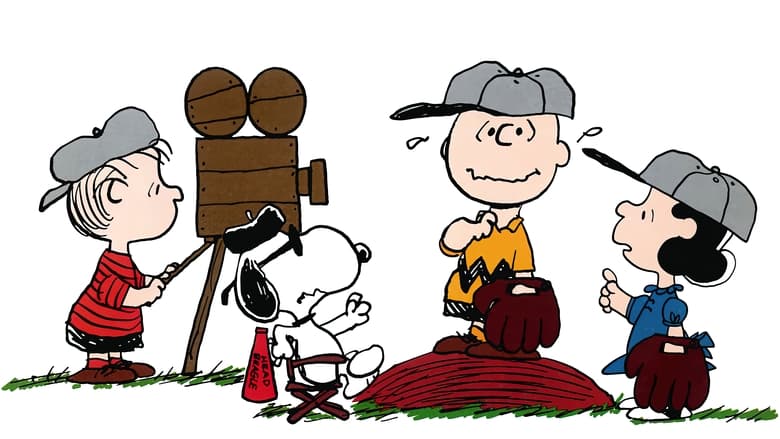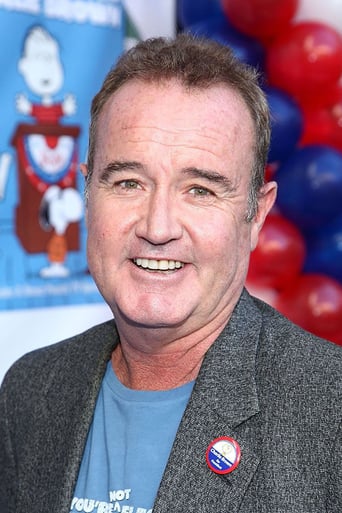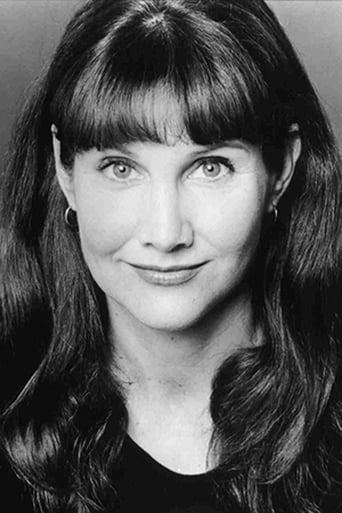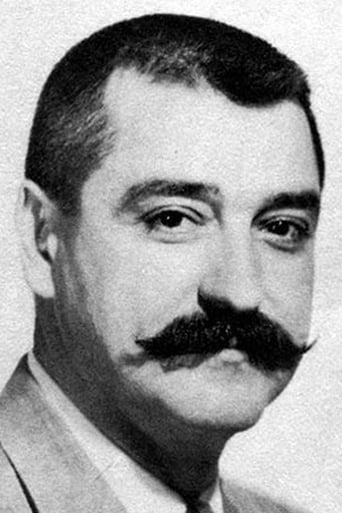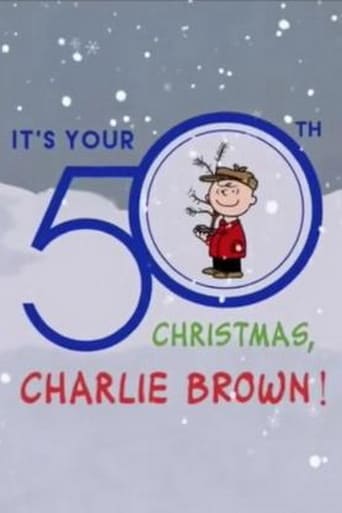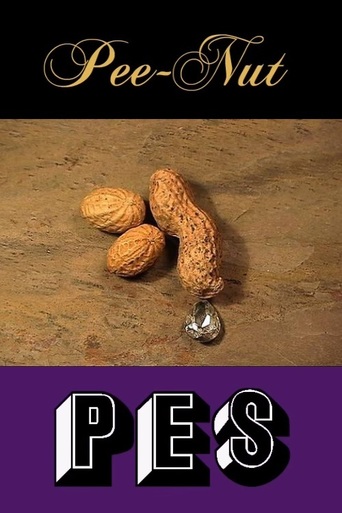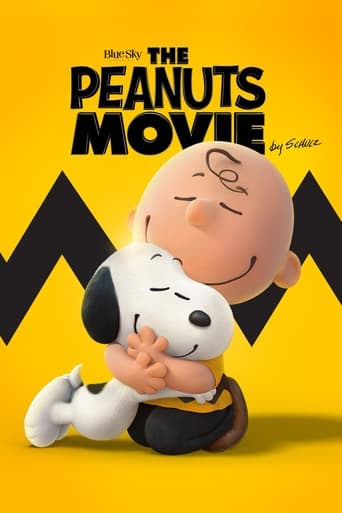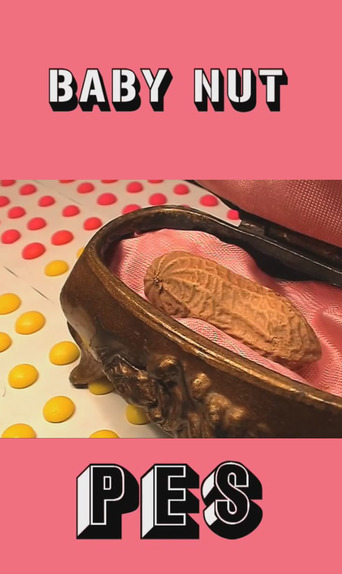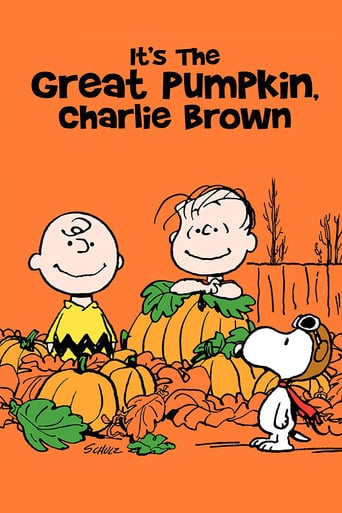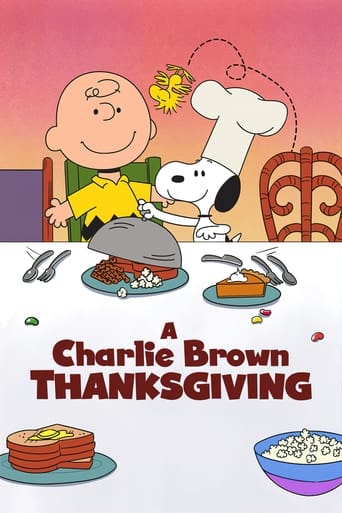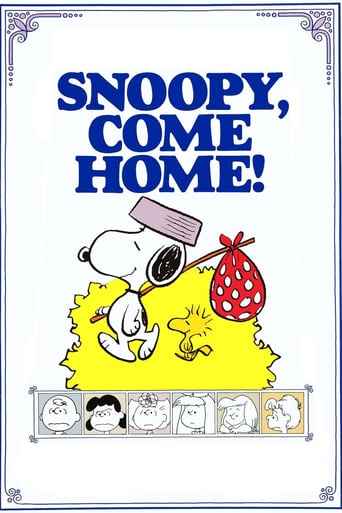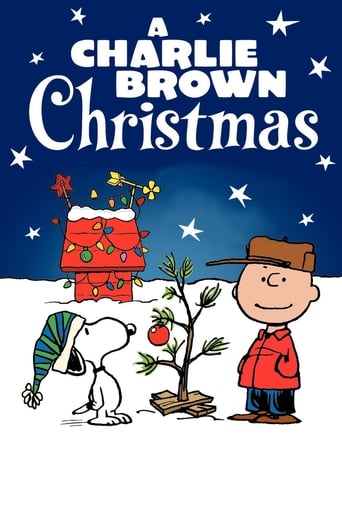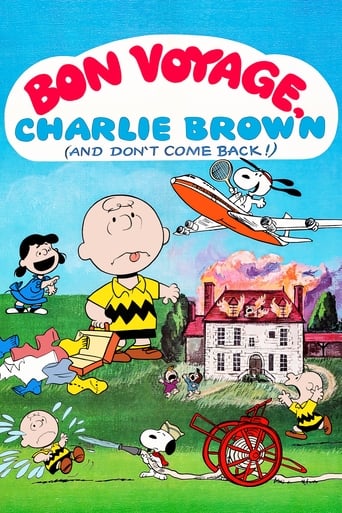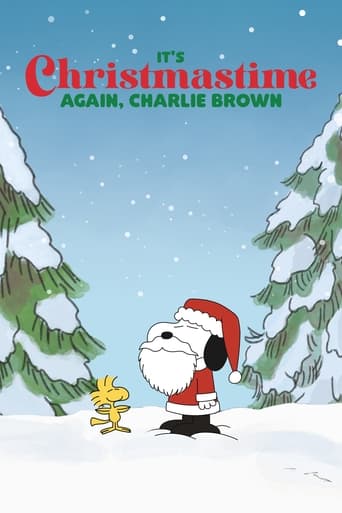A Boy Named Charlie Brown (1969)
Poor Charlie Brown. He can't fly a kite, and he always loses in baseball. Having his faults projected onto a screen by Lucy doesn't help him much either. Against the sage advice and taunting of the girls in his class, he volunteers for the class spelling bee...and wins!
Watch Trailer
Cast
Similar titles
Reviews
Don't listen to the negative reviews
In truth, there is barely enough story here to make a film.
As somebody who had not heard any of this before, it became a curious phenomenon to sit and watch a film and slowly have the realities begin to click into place.
Great story, amazing characters, superb action, enthralling cinematography. Yes, this is something I am glad I spent money on.
In 1969, Charles M. Schulz's beloved comic strip "Peanuts" had become so popular, as had the first six half-hour animated television specials based on it, that Schulz and animation director Bill Melendez decided it was time to bring Charlie Brown, Linus, Lucy, Snoopy, and all of their pals to the big screen for their first feature-length movie. The result was the most delightful and wonderful masterpiece "A Boy Named Charlie Brown", which to my mind is not only the best animated special based on Schulz's comic strip, but maybe even the best animated film ever made.The story borrows elements from some of the strips Schulz had previously published, but also introduces a fresh new storyline. Charlie Brown, the classic American un-success story, is still struggling to prove himself to the world, or at least to himself. Yet despite his greatest efforts, he cannot fly a kite, kick a football, or win a baseball game and is deemed a failure by his peers. But when Charlie Brown discovers he has a talent in a spelling bee and soon becomes selected to take place in a national contest, he finds his peers not only supporting him, but depending on him to succeed and he warily wanders in, determined to win for the first time in his life.I guess the most powerful element for me about "A Boy Named Charlie Brown" is that it contained the greatest message in Schulz's strip and the truest emotion in every young child in America or the world for that matter: the strive to prove oneself and facing the daunting possibility that one might not succeed and wondering how the world will respond to a failure.But Schulz, who wrote the screenplay, wisely decides not to let it become an all-out serious drama, for that would lose the spirit of his classic tale, which would run for nearly half a decade. Incorporated into the story is Schulz's more than imaginative and effective sense of humor. Also incorporated is all of the classic elements of "Peanuts." All of the unforgettable characters and traits that people today, almost ten years after Schulz's death, are still in love with. Charlie Brown's inability to kick a football from under Lucy's hand, his failure to fly a kite or win a baseball game, Linus' dependence on his security blanket, Lucy's lovable fuss-budget attitude, her "psychiatric treatment" for poor Charlie Brown and her unrequited love for Schroeder, Sally's for Linus, and of course, the ubiquitous and enigmatic beagle Snoopy performing one awesome performance after another amongst the characters. Although the film is telling a new story for the characters, it does not depart from the never-ending subplots that we love and cherish. Like in the comics, all adults are hidden from view. Their voices are dubbed by a trombone being played with a hand in the horn. The story is about the children, so it focuses on the children.What's more, for one of the few times, the voice casting is absolutely perfect! Sometimes in previous and following specials, Lucy's voice would be too strident, Linus' would be lacking a lisp, Charlie Brown's would be too high, and so forth. But here, every character, every single character, is matched to the child actor perfectly! Peter Robbins, who voiced Charlie Brown in "A Charlie Brown Christmas" (1965) takes the role for the last time and well, who else could have done it so well? One of the few complaints about the "Peanuts" specials is that the animation is primitive. And yes, it is. Everything is hand-drawn frame-by-frame save for a few rotoscoping shots such as during one of Snoopy's whimsical adventures. But the animation, while primitive, is more than passable, absolutely convincing, it matches Schulz's drawing style so well, and it works. But like with all movies, the strength is not in the look of the picture, but in the story. And "A Boy Named Charlie Brown" scores with both. Every now and again, we see a movie that is so delightful and so wonderful that it leaves a good feeling in your soul that never goes away. And for me at least, "A Boy Named Charlie Brown" was one of them and one of the strongest yet. We follow Charlie Brown so well, because a lot of us can personally identify with him, so that when he's in the national spelling bee, we are rooting for him all the way, hoping that once—just once—he can win and not be a failure in the eyes of his friends.This is the best of the animated "Peanuts" specials. And again, I would even go as far as to say it's the most heart-warming and delightful animated film I've ever seen in my time. And remember, I've seen quite a few.
There's a little Charlie Brown in all of us. He's in our thoughts when we are pessimistic and in our thoughts when we reflect on the early days. Charlie Brown and Snoopy pretty much embody and represent the innocence, simplicity, and charm of childhood. Peanuts may not have the powerhouse reputation it used to have, but to this day remains one of the best comic strip creations in the history of newsprint. Their specials are amazing as well, from the classic Christmas special to the highly underrated "You're a Good Sport, Charlie Brown." In spite of all their success, most forget that Charlie Brown actually starred in a series of feature-length films. A Boy Named Charlie Brown is the first attempt by Shultz and company to bring the beloved character to the big screen.A Boy Named Charlie Brown is known for its musical interludes, amazing score, pop art style, and first display of how Snoopy and his friends would fare quality-wise when extended to past 80 minutes. The movie isn't amazing, but it wasn't a horrific disappointment either. It was Bill Melendez getting his cinematic start with the franchise. There are some lovable moments, excellent one-liners, and heartwarming moments to keep the family entertained. While the movie's choppy animation remains intact (They must never ever get enough money for budget) this is saved because of the multiple ways the story is being presented.In the film, we follow Charlie Brown as he tries to win a national spelling bee after surprisingly winning the competition in his school. But there's more to the tale, as all the cast of the comic strip (besides Marcie and Pepperment Patty) have their own moment to shine; from Snoopy's dreams about being a hockey player and airline pilot to Schroeder's piano solo. Some of these moments are good (Beethoven, Snoopy in World War 1) while some miss the mark (Linus and the blanket, Snoopy ice skating).The animation is very basic, bland, and unforgivably sloppy. While this was forgivable in the Christmas special thanks to its low budget, one would wonder why a phenomenon like Peanuts had such little help in the budgeting while transferring to the big screen. Thankfully, Melendez crafted several ways to visually tell the story, which includes multiple screens, rotoscoping, and sometimes even borrowing styles of Andy Warhol. All these techniques help make up for the shoestring budget and quality of the animation, and also provide defining evidence that this was a 60s film. The pop art undertones are much heavier here than in the next three Peanuts films combined.Charlie Brown would evolve into better-organized movies later in the 70s (Most notable Bon Voyage and Race for Your Life), but this was the writing staff getting their feet wet. The evolution from comic strip to film is an extremely tough one, much harder than television show to the big screen. This is among the first, if not the first, successful experiment of the type; even if it wasn't perfect. There were multiple story lines woven together under one major plot line, and it's not a style of storytelling that would sit well with everyone. With Snoopy Come Home and Race For Your Life, it was one big story with multiple jokes that managed to stretch to past an hour. The spelling bee tale could not have lasted a full length, so Shultz added many more (if, mostly unrelated) tales and scenes as filler. But there are some wonderful moments, and superb one-liners sprinkled throughout ("I'm dying, and all I hear are insults!") Bottom Line: This isn't the best of the Charlie Brown movies, but it's the first and still stands well after all these years. Serving as more a look at the art and styles of animation in the 60s rather than an amusing Charlie Brown picture, this film was proof that the comic strip medium can come to life in bigger ways than television. To this day there are very few decent comic book films, because they don't successfully flesh out their characters or reduce themselves to a quick buck. While you don't see the quality, you certain see the effort Charles M. Schulz delivered on his work. A Boy Named Charlie Brown is the big-screen version of a Charlie Brown Christmas: delightful but not the best; but also the beginning of something very special.
Yep, that's what I said: this cartoon feature-length film featuring the beloved "Peanuts" gang is, like the comics of Schulz, a very realistic and intimate look inside the human psyche, not just of Charlie Brown, but of the Van Pelt kids.Charlie Brown believes he's a complete loser. Albeit, 6-8 year olds may not usually consciously form such a concise opinion of themselves, but, like the comic strip, Charlie Brown's voice is not only that of a perceptive adult, but of the inner child left behind. I don't know why people believe childhood is such a wonderful time. It SHOULD be. By rights, it ought to be our most precious, sacred, worry-free time, and adulthood ought to be the bummer. But in reality, childhood, when adults tower over you controlling your life and people your own size pick mercilessly at you for being the least bit different, is a time we look forward to leaving behind us, but unfortunately drag along with us for the rest of our days. I am now in my late 30s, and stressful career and all, health problems and all, I'll gladly move forward. I'd never revisit childhood, not for a million dollars! Charlie's kite won't fly right, his baseball team is on a 99 game losing streak, and he can't even get his toy boat to sail in the bathtub. He feels miserable, unwanted and depressed. He seeks out the advice of wanna-be psychiatrist Lucy, all the while knowing that Miss Van Pelt is one of his biggest antagonists. She eagerly points out everything wrong with him and how hopelessly dumb and worthless he is, which is what abusive people do when they, deep down, hate themselves worse than they could ever hate you, but need to use you to build up their own meager self esteem. The one trait that spells doom for Charlie every time is his own admission that he believes himself a failure. That only makes Lucy and the other mean girls Violet and Patty, feel more powerful.Desperately seeking self-worth, Charlie Brown decides to try out for the school spelling bee. First he wins against his home classmates, then he wins Spelling Champion of his school. Is this not a victory? Indeed it is, but instead of finding that self worth, and basking in the victory, Charlie dreads his next task, the National Elimination spelling bee in the big city. He berates himself for "getting himself into this mess," and not only makes himself sick with stress and worry, but exhausts himself studying all night before the competition, refusing even to take a nap, fearful that he will let the kids back home down if he doesn't use every minute for study. So it's no wonder he misspells a simple word like "beagle".Second place, 1st runner up, the last to be eliminated. Do these things spell "loser"? You would think not, but naturally, poor lovable self-doubting Charlie Brown thinks its worse than if he had just been beaten earlier, or had never even made it out of his school contests. He took a risk, put himself out there, tried something out, and the results were not what he wanted. Now he feels like a failure as usual and is afraid to ever do anything again, because the humiliation he feels is unbearable.The one "peanut" who seems to genuinely route for Charlie, without any selfish motives, is Linus. If Charlie would open his eyes, he would see that he has at least one true friend in the world, someone who believes in him and doesn't think of him as a total loser just because he didn't win first in the national bee. He even gave Charlie his beloved security blanket for good luck. Somehow, he coaxes Charlie Brown out of his shell of fear and humiliation.The ending is realistic. Things seem not to have changed much since the spelling bee. Snoopy and Linus are still Charlie's closest frients, Lucy is the same ol' conniving meanie yanking the ball away just as Charlie is about to kick it.But Charlie IS changed. Even though he didn't win first place, he has returned home someone new, someone who takes risks and tries new things and works very hard toward a goal, and even though you'll never hear Lucy and the mean girls admit it, this is his victory.Deep down, at some point in our lives, "we're all a boy named Charlie Brown."
This is one of the best animated films I've had the pleasure of seeing. I do remember seeing this film when I was young, and some of the best parts from it. But when I watched it again on DVD, it was like revisiting my childhood.This film, although may not go on my top 5 all-time favourite animated films, has some of the best music done brilliantly in an orchestra way, which I think was great. The title song, sung by Rod McKuen, is wonderful.While it is funny at times, it's beautifully animated and done to the true spirit of the comics. A truly great animated film.
